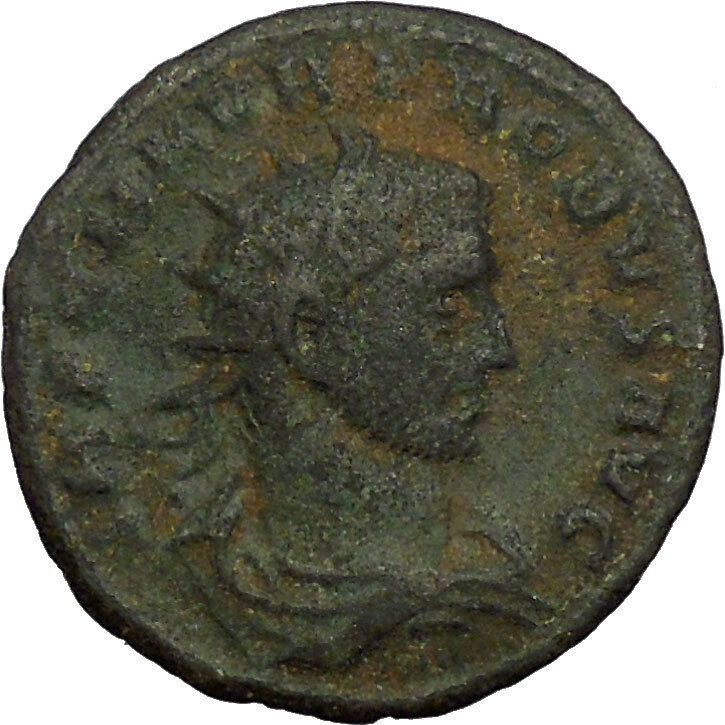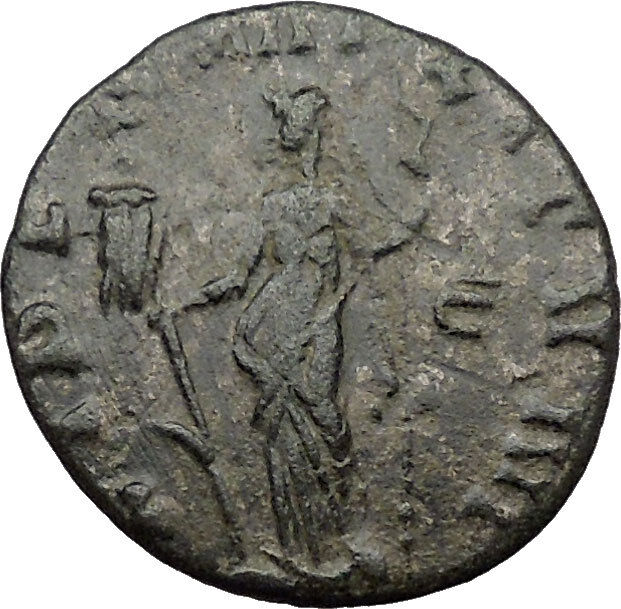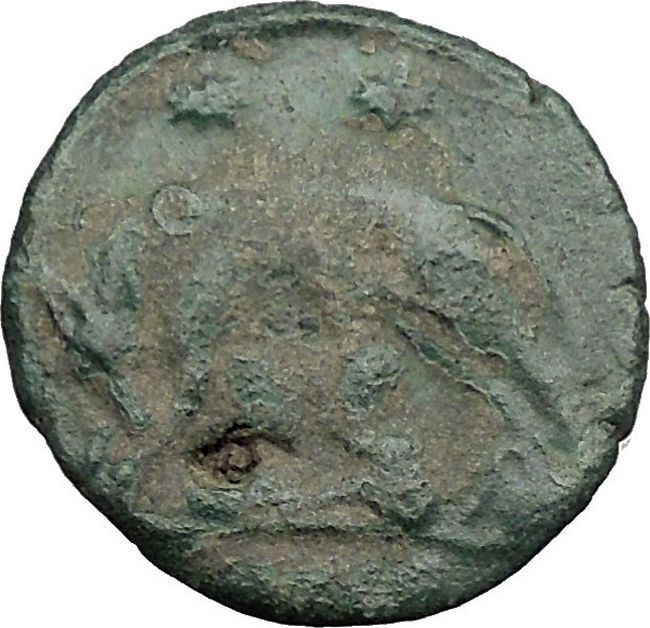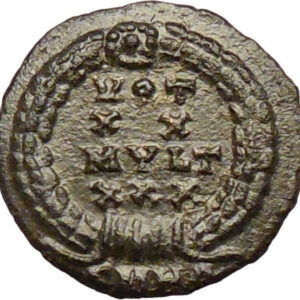|
Septimius Severus
–
Roman Emperor
: 193-211 A.D. –
Silver Denarius 17mm (2.13 grams) Rome mint 198 A.D.
Reference: RIC 118, BMC 253, S 6319, C 357
LSEPTSEVPERTAVGIMPX – Laureate head right.
PACIAETERNAE – Pax seated left, holding branch and scepter.
You are bidding on the exact item pictured,
provided with a Certificate of Authenticity and Lifetime Guarantee of
Authenticity.

In
Roman mythology
, Pax (Latin
for peace
)
(her
Greek
equivalent was
Eirene
) was recognized as a
goddess
during the rule of
Augustus
.
On the
Campus Martius
, she had a temple called the
Ara Pacis
,
and another temple on the
Forum Pacis
. She was depicted in art with
olive
branches, a
cornucopia
and a scepter. There was a festival in her honor on January 3. Daughter of
Jupiter
and
Iustitia
. Pax was often associated with spring.
Eirene, or Irene Greek for “peace”; the
Roman
equivalent was
Pax
, one of the
Horae
, was the personification of peace, and
was depicted in art as a beautiful young woman carrying a
cornucopia
,
sceptre
and a torch or
rhyton
. She is said sometimes to be the
daughter of Zeus
and
Themis
.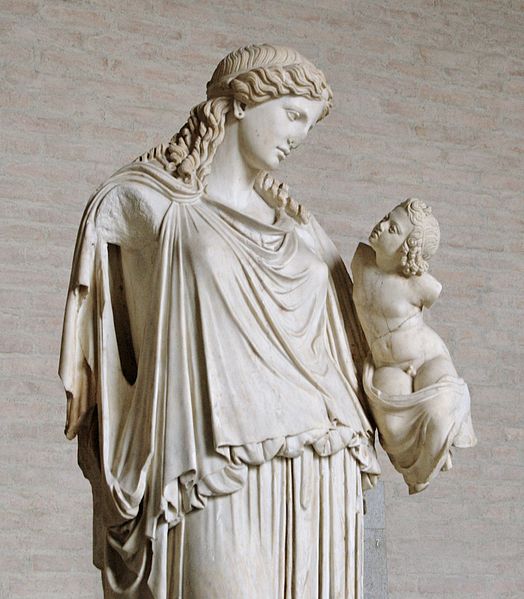
She was particularly well regarded by the
citizens of Athens
. After a naval victory over
Sparta
in 375 BC, the Athenians established a
cult for Eirene, erecting
altars
to her. They held an annual state
sacrifice to her after 371 BC to commemorate the
Common Peace
of that year and set up a votive
statue in her honour in the
Agora of Athens
. The statue was executed in
bronze by
Cephisodotus the Elder
, likely the father or
uncle of the famous sculptor
Praxiteles
. It was acclaimed by the Athenians,
who depicted it on vases and coins.
Although the statue is now lost, it was copied in marble by the Romans; one
of the best surviving copies (right) is in the
Munich
Glyptothek
. It depicts the goddess carrying a
child with her left arm –
Ploutos
, the god of plenty and son of
Demeter
, the goddess of agriculture. Eirene’s
missing right hand once held a sceptre. She is shown gazing maternally at
Ploutos, who is looking back at her trustingly. The statue is an allegory for
Plenty (Ploutos) prospering under the protection of Peace (Eirene); it
constituted a public appeal to good sense. The copy in the Glyptothek was
originally in the collection of the
Villa Albani
in Rome but was looted and taken
to France by
Napoleon I
. Following Napoleon’s fall, the
statue was bought by
Ludwig I of Bavaria
.
L ucius Septimius Severus (or rarely Severus I) (April 11, ucius Septimius Severus (or rarely Severus I) (April 11,
145/146-February 4, 211) was a
Roman
general, and
Roman
Emperor
from April 14, 193 to 211. He was born in what is now the
Berber
part of
Rome’s historic
Africa Province
.
Septimius Severus was born and raised at
Leptis
Magna
(modern Berber
, southeast of
Carthage
,
modern Tunisia
).
Severus came from a wealthy, distinguished family of
equestrian
rank. Severus was of
Italian
Roman ancestry on his mother’s side and of
Punic
or
Libyan
-Punic[1]
ancestry on his father’s. Little is known of his father,
Publius Septimius Geta
, who held no major political status but had two
cousins who served as consuls under emperor
Antoninus Pius
. His mother, Fulvia Pia’s family moved from
Italy
to
North
Africa
and was of the
Fulvius
gens,
an ancient and politically influential clan, which was originally of
plebeian
status. His siblings were a younger
Publius Septimius Geta
and Septimia Octavilla. Severus’s maternal cousin was
Praetorian Guard
and consul
Gaius Fulvius Plautianus
.[2]
In 172, Severus was made a
Senator
by the then emperor
Marcus Aurelius
. In 187 he married secondly
Julia
Domna
. In 190 Severus became
consul
, and in
the following year received from the emperor
Commodus
(successor to Marcus Aurelius) the command of the
legions
in Pannonia
.
On the murder of
Pertinax
by
the troops in 193, they proclaimed Severus Emperor at
Carnuntum
,
whereupon he hurried to Italy. The former emperor,
Didius Julianus
, was condemned to death by the Senate and killed, and
Severus took possession of Rome without opposition.
The legions of
Syria
, however, had proclaimed
Pescennius Niger
emperor. At the same time, Severus felt it was reasonable
to offer
Clodius Albinus
, the powerful governor of Britannia who had probably
supported Didius against him, the rank of Caesar, which implied some claim to
succession. With his rearguard safe, he moved to the East and crushed Niger’s
forces at the
Battle of Issus
. The following year was devoted to suppressing Mesopotamia
and other Parthian vassals who had backed Niger. When afterwards Severus
declared openly his son
Caracalla
as successor, Albinus was hailed emperor by his troops and moved to Gallia.
Severus, after a short stay in Rome, moved northwards to meet him. On
February
19
, 197
,
in the
Battle of Lugdunum
, with an army of 100,000 men, mostly composed of
Illyrian
,
Moesian
and
Dacian
legions,
Severus defeated and killed Clodius Albinus, securing his full control over the
Empire.
Emperor
Severus was at heart a
soldier
, and
sought glory through military exploits. In 197 he waged a brief and successful
war against the
Parthian Empire
in retaliation for the support given to Pescennius Niger.
The Parthian capital
Ctesiphon
was sacked by the legions, and the northern half of
Mesopotamia
was restored to Rome.
His relations with the
Roman
Senate
were never good. He was unpopular with them from the outset, having
seized power with the help of the military, and he returned the sentiment.
Severus ordered the execution of dozens of Senators on charges of corruption and
conspiracy
against him, replacing them with his own favorites.
He also disbanded the
Praetorian Guard
and replaced it with one of his own, made up of 50,000
loyal soldiers mainly camped at
Albanum
, near Rome (also probably to grant the emperor a kind of centralized
reserve). During his reign the number of legions was also increased from 25/30
to 33. He also increased the number of auxiliary corps (numerii), many of
these troops coming from the Eastern borders. Additionally the annual wage for a
soldier was raised from 300 to 500
denarii
.
Although his actions turned Rome into a military
dictatorship
, he was popular with the citizens of Rome, having stamped out
the rampant corruption of Commodus’s reign. When he returned from his victory
over the Parthians, he erected the
Arch of Septimius Severus
in Rome.
According to Cassius Dio,[3]
however, after 197 Severus fell heavily under the influence of his Praetorian
Prefect,
Gaius Fulvius Plautianus
, who came to have almost total control of most
branches of the imperial administration. Plautianus’s daughter,
Fulvia Plautilla
, was married to Severus’s son, Caracalla. Plautianus’s
excessive power came to an end in 205, when he was denounced by the Emperor’s
dying brother and killed.[4]
The two following praefecti, including the jurist
Aemilius Papinianus
, received however even larger powers.
Campaigns in Caledonia (Scotland)
Starting from 208 Severus undertook a number of military actions in
Roman
Britain
, reconstructing
Hadrian’s Wall
and campaigning in
Scotland
.
He reached the area of the
Moray
Firth
in his last campaign in Caledonia, as was called Scotland by the
Romans.[5].
In 210 obtained a peace with the
Picts
that lasted
practically until the final withdrawal of the Roman legions from Britain
[6]
,
before falling severely ill in
Eboracum
(York).
Death
He is famously said to have given the advice to his sons: “Be harmonious,
enrich the soldiers, and scorn all other men” before he died at Eboracum on
February 4
,
211[7].
Upon his death in 211, Severus was
deified
by the Senate and succeeded by his sons,
Caracalla
and
Geta
, who were advised by his wife
Julia
Domna
.[8]
The stability Severus provided the Empire was soon gone under their reign.
Accomplishments and Record
Though his military expenditure was costly to the empire, Severus was the
strong, able ruler that Rome needed at the time. He began a tradition of
effective emperors elevated solely by the military. His policy of an expanded
and better-rewarded army was criticized by his contemporary
Dio Cassius
and
Herodianus
: in particular, they pointed out the increasing burden (in the
form of taxes and services) the civilian population had to bear to maintain the
new army.
Severus was also distinguished for his buildings. Apart from the triumphal
arch in the Roman Forum carrying his full name, he also built the
Septizodium
in Rome and enriched greatly his native city of
Leptis
Magna
(including another triumphal arch on the occasion of his visit of
203).
Severus and Christianity
Christians were
persecuted
during the reign of Septimus Severus. Severus allowed the
enforcement of policies already long-established, which meant that Roman
authorities did not intentionally seek out Christians, but when people were
accused of being Christians they could either curse
Jesus
and make an
offering to
Roman gods
, or be executed. Furthermore, wishing to strengthen the peace by
encouraging religious harmony through
syncretism
,
Severus tried to limit the spread of the two quarrelsome groups who refused to
yield to syncretism by outlawing
conversion
to Christianity or
Judaism
.
Individual officials availed themselves of the laws to proceed with rigor
against the Christians. Naturally the emperor, with his strict conception of
law, did not hinder such partial persecution, which took place in
Egypt
and the
Thebaid
, as
well as in
Africa proconsularis
and the East. Christian
martyrs
were
numerous in Alexandria
(cf.
Clement of Alexandria
, Stromata, ii. 20;
Eusebius
, Church History, V., xxvi., VI., i.). No less severe were
the persecutions in Africa, which seem to have begun in 197 or 198 (cf.
Tertullian’s
Ad martyres), and included the Christians known in the
Roman martyrology
as the martyrs of
Madaura
.
Probably in 202 or 203
Felicitas
and
Perpetua
suffered for their faith. Persecution again raged for a short time
under the proconsul
Scapula
in
211, especially in
Numidia
and
Mauritania
.
Later accounts of a Gallic
persecution, especially at
Lyon, are
legendary. In general it may thus be said that the position of the Christians
under Septimius Severus was the same as under the
Antonines
;
but the law of this Emperor at least shows clearly that the
rescript
of
Trajan
[
neededclarification] had failed to execute its purpose..
|






 ucius Septimius Severus (or rarely Severus I) (April 11,
ucius Septimius Severus (or rarely Severus I) (April 11, 